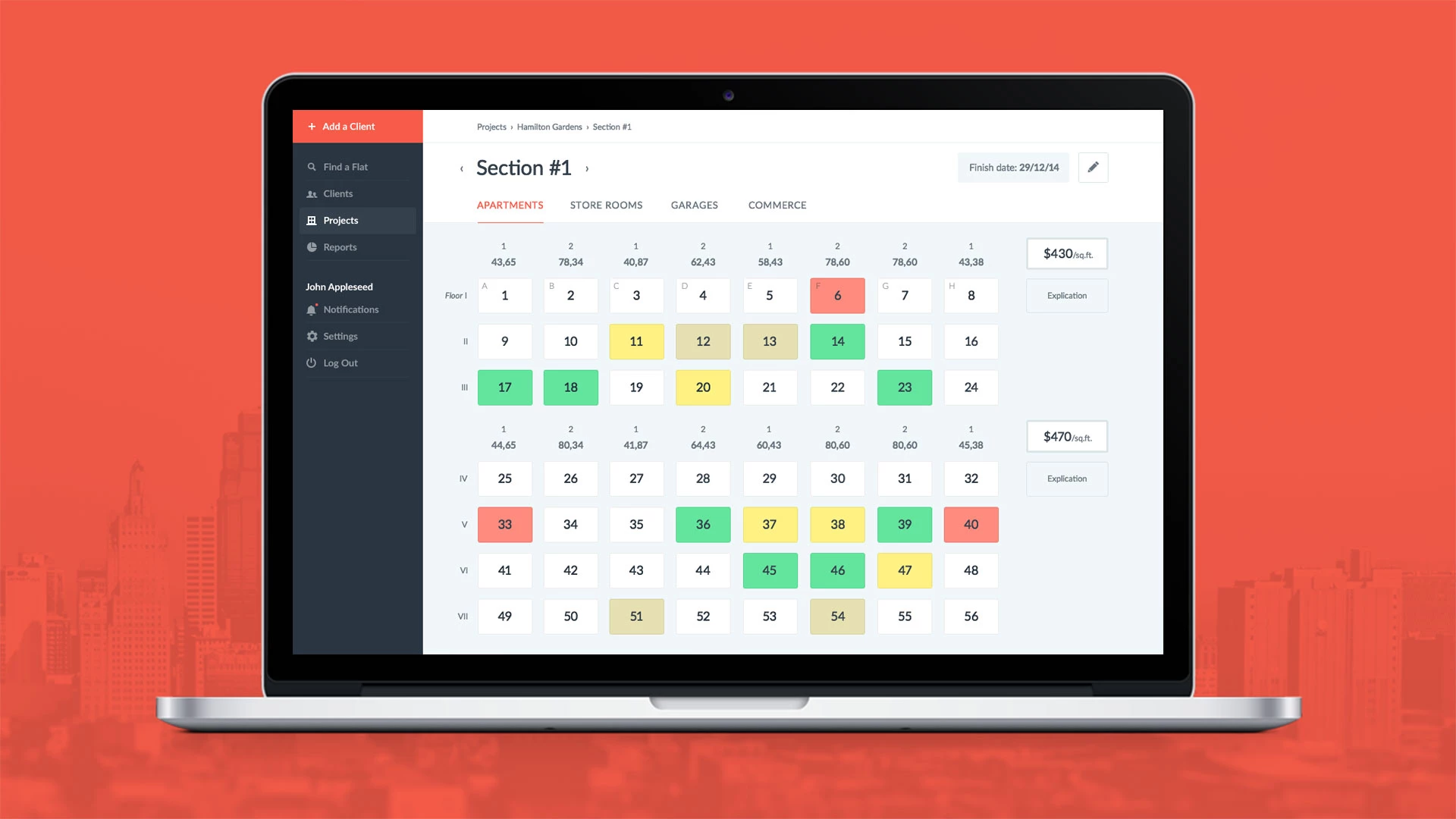
According to Grand View Research, the global prop market reached $5.51 billion in 2023. It will grow at a CAGR of 8.9% from 2024 to 2030. This growth includes the demand for web-based services.
If you want to create custom software for property management, you're in the right place. This blog post outlines the steps to develop successful software for property managers.
Based on our experience, we created this guide to help you understand the basics of proptech. We have extensive expertise in software development. Our company can become your trusted partner in creating an effective solution.
We'll cover identifying essential property management system software features and a successful product launch.
Let's delve into the commercial real estate software development journey and prompt your venture!
How to Develop Property Management Software for Real Estate in 8 Steps
Now, we are proceeding with a real estate management software development process. From defining the scope to launching and deploying different types of custom property management systems.
1. Define the Scope
Before starting development, define the scope of the software and the key functions. This includes property listings, tenant management, rental income tracking, and financial reporting. A list of features helps set clear expectations and includes all critical aspects.
Consider how the solution will manage and display properties for real estate listings. This feature should be intuitive for searching, filtering, and managing listings. It should be features that make the whole renting process smooth, from renewal applications to easy communication between the property manager and the tenant. Rental income should be tracked with accuracy, for example, through tools for monitoring payments and invoicing for financial reporting. The software should also offer solid financial reporting.
Apply a software estimate for your project to remain within budget and time estimates. Such a tool will help in the development cost estimation of every feature. It can give you a better understanding of financial and resource planning. This step is very crucial because, at this stage, the development team gets aligned with the business objectives. The final product will meet all the functional requirements and stay within your budget.
2. Choose a Platform
Next, select a development platform for your software. This step is usually part of the Discovery phase services for product development, which you can arrange with your contractor. You have several options, including web apps, mobile apps, or desktop apps. Your choice should involve users' needs and your development team's experience. For example, a mobile platform is best if your target audience needs easy access on the go. The desktop is more useful if your software requires detailed interfaces.
3. Choose the Right Development Team
Choosing the right team is crucial to the success of your software project, especially when hiring a web development agency with relevant domain experience. Choose developers, designers, and QAs who have experience on similar projects. A team with experience will understand what is required of the project. It will ensure that they can come up with a product that will meet your needs.
Collaboration ensures that your vision meets a functional and high-quality product.
4. Create a Design Plan
The next step is to develop a comprehensive design plan for the software. It covers the user interface (UI), user experience (UX), and software architecture.
From the UI itself, it's about creating an intuitive, compelling layout that is easy to use, meaning proper color scheme, typography, and layout structure. That should strike a chord in the audience and continue to screen and device consistency. It is a design that would catch the eye and make the application easy to use.
Want a web app that does more?
Let's build a solution that's smart, sleek, and powerful.
Alina
Client Manager

The focus now shifts towards getting a deeper understanding and optimizing user interaction with the software. The mapping of the user journeys to identify key touch and pain points is part of this process. Through such analysis of the user journeys, designers implement features that users need. Usability testing can be done at different instances of development. Real feedback identifies problems, allowing the team to make necessary tunes before the release. This assurance ensures the solution meets its functional requirements and is not void of user-centeredness.
The software architecture supports scalability, performance, and security. This involves choosing the right tech and defining data structures. Also, creating communication protocols allows the software to function under different conditions. Integrating UI/UX design with architecture will give you a solid solution.
5. Develop the Software
The development team creates software based on a 3-tier architecture. The presentation tier represents UI and UX. The business logic tier holds core application functionality. The data access tier manages data storage and retrieval. This structured approach increases scalability and security, making future maintenance and upgrades much easier.
The custom real estate software development process begins with coding and implementing the functions. The team focuses on creating a responsive user interface that meets the specifications. Then, they set up the back-end infrastructure, ensuring the business logic runs well.
6. Integrate Third-Party Services
Such custom property management software requires the smooth integration of third-party services. For instance, payment systems, websites of property listings, and tenant communication. All these are critical for performance and smoothness. It enables automated rent collection and real-time updates on changes in property availability.
For this, a reliable API or application programming interface is essential. It extends safety and efficiency regarding data exchange between software and other services. APIs ensure updated transactions and information related to properties. They will reflect on all the platforms. APIs make the performance of the software more reliable and user-friendly.
Integrations at the development stage make the software more functional and simplify routine. For instance, automated payment processing can reduce the risk of errors and delays. Synchronized property listings can attract potential tenants. With these integrations, custom property management software improves UX and drives business growth.
7. Testing
After developing a custom property management system, testing and debugging ensure that every feature works as intended. We begin with unit testing, where individual components or functions are isolated. This verifies that components function correctly. The integration testing evaluates how different modules or services work together.
System testing reviews the software to see if it meets the requirements and actually works well. This would include performance, security, and usability testing. UAT involves the real users/stakeholders interacting with the software.
Debugging is necessary to find and fix issues or bugs throughout this process. Testing and debugging continue until the software is stable and ready to deploy.
8. Launch and Deploy
After testing, QA and debugging, the software is ready to be launched and deployed. Ensure all the software architecture documentation, tech specifications, and APIs are current. You need to provide manuals and training material for flawless user adoption. Strategize a deployment plan by ensuring proper configuration and security measures. By preparing for a launch, one can provide a successful deployment.
Property Management Software Development Costs
Estimating the cost of a property management app development takes time and effort. Factors like development time, hourly rates, required features, and complexity influence costs.
Be cautious of companies offering fixed-budget promises without understanding your app's needs. Assessing the features essential for your proptech is crucial for getting cost estimates.
Development of an MVP starts around $35,000 and takes 2 to 4 months. Property management software with advanced features can range from $85,000 to $100,000.
Consult experts to discuss your app's requirements for estimates tailored to your project. This ensures you receive an estimate that meets your specific needs.
You can find out more about PMS development costs here.
Our Experience
Discovery Phase for a Real Estate Company
At the client's request, we provided a complete solution. It includes a dashboard for managing tenants and a real estate marketplace.
A mobile app for tenants to handle services and payments. The outcome? A solution with an MVP and two versions for web and mobile. We delivered detailed prototypes, user stories, a product vision, and a planned budget.
CRM system
Our team engineered a CRM system tailored for a construction company. Scope of work encompassed: System design, UI design, Functional prototype development, Visual language establishment, Typography refinement. We used Symfony2 and MySQL and built a distributed client-service architecture with RESTful API interaction.
We created a single-page application (SPA) with fast UI feedback using Ember.js. Our solutions provide rapid performance, scalability, and easy maintenance. It was done despite complex design and data processing needs.
A custom solution is the ideal choice if you see the benefits of creating a unique design and features. At Stfalcon, our dedicated team is ready to assist you. Our expert developers and UI/UX designers will collaborate on a unique solution. QA specialists will ensure that the solution meets the highest quality assurance standards.
Read Also:
Bottom Line
Investing in property software management will be the strategic move for business. PMS offers efficiency, automates administrative duties, elevates the experience for tenants, etc.
Collaborating with a trusted software development vendor can empower your business. Seize the opportunity of the property management software development service—contact us today. Let’s embark on the journey towards a streamlined process.
Now it is time to delve into the FAQ section below for detailed answers about developing a real estate app.
FAQs
What is real estate management software?
Real estate management software is vital for property managers, landlords, and others. It handles back-office tasks like tenant screening, listing creation, rent collection, and scheduling. Each offers tailored functionalities in residential, commercial, and specialized versions.
What are the benefits of real estate management software?
Real estate businesses can create a property management system to streamline tenant interactions and efficiently collect rent. Custom real estate management tools offer many advantages compared to ready-made software. Custom solutions offer unlimited customization options, allowing businesses to have tailored features. The lease model for software development helps to access resources and concentrate on a software product. It helps property managers keep track of rent payments and maintenance requests in a centralized database.
What are the typical errors in developing a real estate management application?
Common mistakes in software development include not conducting thorough research before starting. The initial discovery phase is crucial for success. Another mistake is building a solution without creating an MVP. It allows testing in real-world scenarios to identify issues while minimizing costs. Not knowing user needs by failing interface, architecture, and features can cause issues.
How do you choose a reliable software development company?
Opt for a software development company with extensive expertise. Consider the technology stack, past projects, and client feedback.

 Read the full case study
Read the full case study
 Read the full case study
Read the full case study
